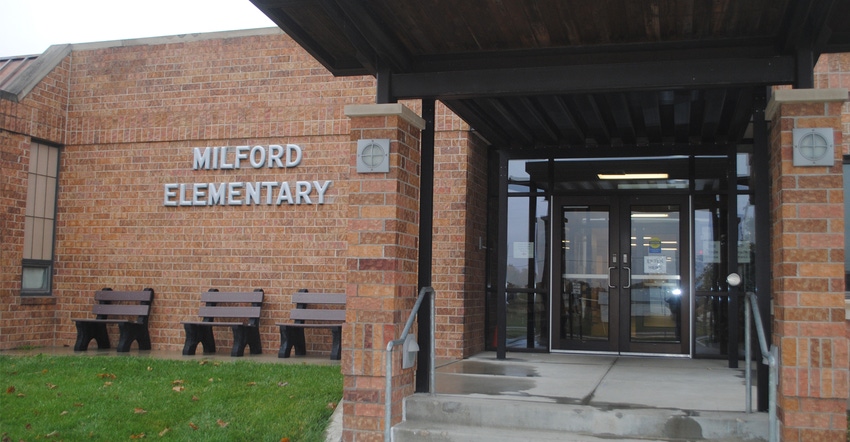
Dave Welsch of Milford, Neb., is a farmer, but he also has served on local school boards — first with a Class 1 school, and over the past 23 years, on the Milford Public Schools board for a total of more than 30 years of service.
He has served nearly two decades as president of the school board at MPS. His experience as a farmer and a school board member has given him unique insights into school funding in Nebraska.
Property taxes
“As self-employed businesspersons, farmers are very aware of how property taxes affect their bottom line,” Welsch notes. “In our district, a farmer might pay close to $100 per acre in school property taxes, while right across the fence in a neighboring district, the taxes are less than $50.
“The reason for the difference is that the Milford district has a much lower valuation per student than our neighbors, so even though our neighbors spend about 50% more per student, our taxes are double due to the lower valuation.”
He also cites the state’s lack of ability to come up with a school state aid formula that compensates enough for those types of differences.
On the MPS school board, Welsch has served on the board’s negotiations and building committees.
“We’ve had about six major construction projects, with only one of them funded by a bond issue over 20 years ago,” Welsch says. “Since then, we have chosen to use other means of funding our construction projects, so that we can save taxpayer money by paying off the projects much sooner than it would take with a bond issue.”
He says that some of the school funding plans being proposed through the Nebraska Legislature may help to take the state out of 49th place in state support of education in the U.S.
“These plans will need to be closely watched, so that the changes will help bring down everyone’s property tax levies and also bring them closer together across the state,” Welsch says.
Welsch, who has testified over the past few years on behalf of his school district on legislation before the Nebraska Unicameral, understands the importance to farmers and to rural school districts of how schools are funded.
Kevin Wingard, superintendent at MPS, understands these issues extremely well, and appreciates the work Welsch does.
“Most importantly, Dave takes the time to learn the financial aspects of operating and funding a school district,” Wingard says. “MPS is unique in this area of the state, as we have a very low valuation in comparison to schools around us, so we do rely on state aid in combination with our local property taxes. Any increases in school levies are mainly a result of ag land valuation increases that cause a decrease in state funding and are not a result of an increase in school spending.
“As a farmer, Dave is well-positioned to explain these kinds of shifts to local taxpayers,” Wingard adds.
Welsch thinks farmers should be involved more in the policy-shaping discussions through contact with their senators and through hearings at the state level.
Be part of the debate
Visit the Unicameral website, Welsch suggests, to follow bills through the process.
“The problem is that there can be over 700 bills introduced in a session, so it is hard to find the bills you might be interested in,” Welsch says. “You may want to connect with an education or farm group that is involved at the Legislature. Contact your state senator and get on their newsletter list if they have one. Or simply call your senator and ask if there are bills dealing with an issue you are interested in. The staff at the Legislature can be very helpful.”
He also recommends reading newspaper articles and columns about what is happening at the Unicameral.
As for testifying at hearings or contacting senators to give input, Welsch offers advice. “The main lesson I have learned is that the senators are no different than you or me,” he says. “They might be our neighbor, fellow church member, local businessperson or farmer. They are involved in and care about their local communities, just like we do.”
The only difference is that these individuals have chosen to take their involvement to the state level.
“Secondly, I have learned to be prepared,” Welsch explains. “Read and study the bill you are interested in, so you understand what the intent is and how it might impact you, your community or the state. Talk to groups or individuals who may have a deeper understanding of the bill to help you understand its impacts.”
At committee hearings, those testifying usually have just three to five minutes to speak to the committee, usually made up of eight senators. “You can also provide handouts for them to review. At the end of your testimony,” Welsch adds, “they may ask you questions. If you don’t know the answer, simply tell them so, and that you will check into it and get back to them.”
Welsch says that the senators want to hear from people. “They may not always agree with us, but they are interested in our opinions,” he says.
Learn more about bills proposed through the Nebraska Legislature at nebraskalegislature.gov.
About the Author(s)
You May Also Like






